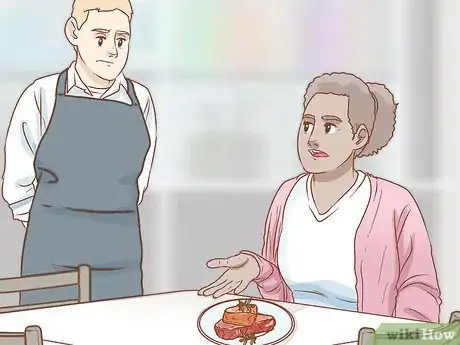This article was co-authored by wikiHow Staff. Our trained team of editors and researchers validate articles for accuracy and comprehensiveness. wikiHow's Content Management Team carefully monitors the work from our editorial staff to ensure that each article is backed by trusted research and meets our high quality standards.
This article has been viewed 271,461 times.
Learn more...
Politely complaining in a restaurant can make the difference between creating a scene or being flippant and correcting a mistake in order to resume an enjoyable night out. Acting immediately, staying calm, clearly explaining your complaint, and requesting a manager are all ways to complain in a restaurant without being rude, awkward, or difficult.
Steps
Reporting Food and Service
-
1Act immediately. The key to successful complaining is to highlight the problem right away, thereby giving the restaurant the opportunity to resolve the problem with minimum fuss. The sooner you alert the staff of your complaint the quicker it can be resolved.
- Don’t complain about a meal after you’ve eaten half of it unless you encounter harmful or dangerous cooking.
-
2Get your server’s attention. If you have a complaint slightly raise your hand, politely make eye contact to communicate to your server that you need attention, discreetly call the waiter over, explain the problem, and ask him or her to resolve the situation. If your server is inattentive, or is not aware of your attempts to get their attention, try getting the attention of another server and explain your issue.
- Try to avoid leaving your seat to find your server. There should be plenty of opportunity to get the attention of another server or manager.
Advertisement -
3Be clear and concise. The clearer you can be about the issue you would like resolved the easier the restaurant will be able to help you. Speak clearly and avoid mumbling when addressing staff about a complaint.
- Try not exaggerate the problem by saying things like “I hate this,” “This is disgusting,” or “I can’t eat this.” Instead, try to state the problem as clearly as possible, “My food is undercooked,” “I asked for no dairy,” or “This isn’t what I ordered.”
-
4Immediately report any illnesses. If, once you've left a restaurant, you become ill from food poisoning caused by poor food handling, immediately report it to the restaurant and local health department or food standards agency.
Consulting Management
-
1Ask to speak to a manager. The high majority of issues in a restaurant stem from poor organization, training, or recruitment. Asking to speak to a manager will help everyone find the source of the problem as quickly as possible, whether that may be your server, the kitchen, or the management.[1]
- Politely ask to speak to manager after you’ve finished giving your complaint to your server, as in “I would like to speak to your manager, thank you.”
- Managers also tend to have a more comprehensive view of how the restaurant is running that day and may give you a reason as to why the service or food isn’t satisfactory.[2]
-
2Don’t pry for free compensation. It is ultimately up to the restaurant to decide how they are going to compensate your complaint. Any decent restaurant knows that they can turn any complaint or criticism into a positive and enjoyable experience. However, if you believe you did not receive what you paid for, such as raw food or ignoring a food allergy, politely speak to a manager about possible reimbursement.[3]
- Kindly ask the manager if there is a possibility of being compensated by repayment or a voucher if your meal was inadequate, as in “My food was served to me raw and I’m wondering if there is anything you might be able to do.”
- Remember, their goal is not only customer service, but customer loyalty. They would like to see you again so their compensation may surprise you.[4]
-
3Stay calm. Staying calm will help resolve whatever issue there might be as quickly as possible. The more rude or flippant you are the less likely the management will be to help you. Do not automatically blame the waiter; keep in mind that a long wait for food or a dish that is not cooked to your satisfaction is probably the fault of the chef rather than the server.[5]
- There should be no reason to raise your voice. Understand that mistakes happen.
-
4Avoid threats. Threatening to leave a bad review on Yelp or TripAdvisor won’t do much toward resolving your complaint. Staff and managers at a restaurant understand the value of constructive criticism in the service industry. Threatening them with a bad review will make you seem flippant and angry and will not inspire the staff to try and make your experience anymore enjoyable.[6]
- Instead of turning to Yelp or TripAdvisor, write an email to the restaurant expressing your disappointment. You’ll be surprised at how responsive they might be.[7]
Community Q&A
-
QuestionWhat can I do if the manager of the restaurant won't return my calls and there is no place for email on the website?
 Community AnswerYou're unlikely to get a response. Consider filing a complaint through the Better Business Bureau, or leave negative reviews of the restaurant on social media and sites like Yelp.
Community AnswerYou're unlikely to get a response. Consider filing a complaint through the Better Business Bureau, or leave negative reviews of the restaurant on social media and sites like Yelp. -
QuestionIs it mandatory for the restaurant to ask for a tip from the customer?
 Community AnswerThe restaurant doesn't ask for a tip, it is a gratuity that you give for the service provided. If the service is extremely poor due to the server, then the tip should be lower, but if the service is poor beyond the server's control, the server shouldn't be penalized. The tip doesn't go to the kitchen staff; it is for the server, bus boys, and sometimes bartenders. In many states, servers are paid a "server's wage," which is generally less than $3/hour. Customers should figure in a tip when deciding if they have enough money to eat out.
Community AnswerThe restaurant doesn't ask for a tip, it is a gratuity that you give for the service provided. If the service is extremely poor due to the server, then the tip should be lower, but if the service is poor beyond the server's control, the server shouldn't be penalized. The tip doesn't go to the kitchen staff; it is for the server, bus boys, and sometimes bartenders. In many states, servers are paid a "server's wage," which is generally less than $3/hour. Customers should figure in a tip when deciding if they have enough money to eat out. -
QuestionWhat if the food is at room temperature?
 Community AnswerPoint out to your server that the food is not as hot or cold as it should be.
Community AnswerPoint out to your server that the food is not as hot or cold as it should be.
References
- ↑ https://www.washingtonpost.com/lifestyle/food/have-a-problem-in-a-restaurant-speak-up-promptly-and-let-a-manager-help/2015/01/12/a5bcc5da-9784-11e4-aabd-d0b93ff613d5_story.html
- ↑ https://www.washingtonpost.com/lifestyle/food/have-a-problem-in-a-restaurant-speak-up-promptly-and-let-a-manager-help/2015/01/12/a5bcc5da-9784-11e4-aabd-d0b93ff613d5_story.html
- ↑ https://www.theguardian.com/lifeandstyle/2013/jul/19/how-to-complain-in-restaurant
- ↑ https://www.theguardian.com/lifeandstyle/2013/jul/19/how-to-complain-in-restaurant
- ↑ https://www.theguardian.com/lifeandstyle/2013/jul/19/how-to-complain-in-restaurant
- ↑ https://www.theguardian.com/lifeandstyle/wordofmouth/2014/sep/05/food-and-drink2
- ↑ https://www.theguardian.com/lifeandstyle/wordofmouth/2014/sep/05/food-and-drink2
About This Article
To complain in a restaurant, stay calm and be polite so you don't cause a scene or come across as rude and difficult. Right when you notice something is wrong, politely get your server's attention and explain what the problem is. Or, if your server is being inattentive, try flagging down another employee that's passing by. If the problem is serious, or if you don't think your server's response is adequate, politely ask to speak to a manager. To learn how to express your complaint clearly and concisely, keep reading!



































































